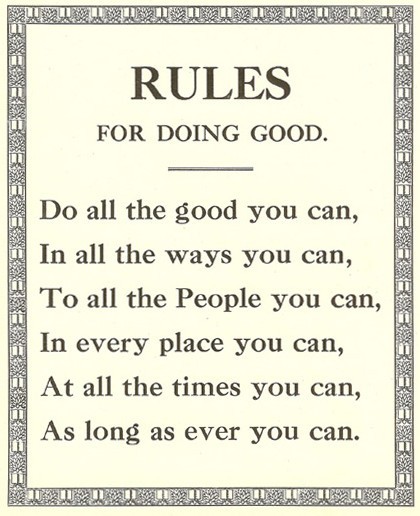People often assume the worst of others. We judge too quickly, assigning motive to actions with little to no information. Then, when true facts arrive, the unfortunate strength contained within first impressions cements our original impressions despite evidence to the contrary. Conversely, the same actions affect other people’s view towards us.
If you do good, people will accuse you of selfish ulterior motives. Do good anyway.
This commandment contains two powerful suggestions - do good no matter what, and don't worry about what other people think. Acting in this spirit helps to move you forward on solid footing.
 I believe in the contagion of good actions. Good breeds good. One good turn deserves another. Pay it forward. No matter the collection of words, the intent and meaning carries truth and power. Despite how others may view your actions, and no matter the size, the inherent truth and goodness contained within infects others. Soon, through consistent good action, your life changes. You become contagious. You infect others. Goodness spreads. The disease others decried as self-serving becomes the norm instead of the oddity.
I believe in the contagion of good actions. Good breeds good. One good turn deserves another. Pay it forward. No matter the collection of words, the intent and meaning carries truth and power. Despite how others may view your actions, and no matter the size, the inherent truth and goodness contained within infects others. Soon, through consistent good action, your life changes. You become contagious. You infect others. Goodness spreads. The disease others decried as self-serving becomes the norm instead of the oddity.- I first encountered an adapted version of the “Paradoxical Commandments,” titled “The Final Analysis,” while listening to a Wayne Dyer audio CD in my early twenties. The meaning and message struck me as true, helping guide my thoughts and actions as I developed from a big kid into a real adult. Later, I discovered the poem was not actually written by Mother Theresa at all, but adapted, framed, and hung on the wall in her Calcutta orphanage. She cared about its message enough to use it to empower the weak and marginalized children to whom she gave her life.
The Paradoxical Commandments are reprinted with permission. © Copyright Kent M. Keith 1968, renewed 2001


No comments:
Post a Comment